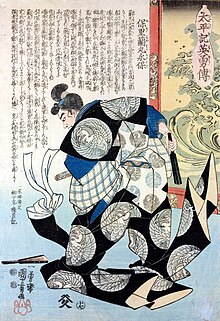| Revision as of 22:03, 20 April 2013 editSeeminglySubdued (talk | contribs)98 edits →In popular culture← Previous edit | Revision as of 07:03, 29 May 2013 edit undoWandaiu (talk | contribs)10 editsm Kanji mistakeNext edit → | ||
| Line 3: | Line 3: | ||
| {{japanese name|Mori}} | {{japanese name|Mori}} | ||
| {{nihongo|'''Mori Ranmaru'''|森 蘭丸|extra=1565–June 21, 1582}}, born '''Mori Naritoshi'''<ref>Ota Gyuichi. ''The Chronicle of Lord Nobunaga''. Brill Academic Press (2011). ISBN 9004201629 Page 311</ref> (森 |
{{nihongo|'''Mori Ranmaru'''|森 蘭丸|extra=1565–June 21, 1582}}, born '''Mori Naritoshi'''<ref>Ota Gyuichi. ''The Chronicle of Lord Nobunaga''. Brill Academic Press (2011). ISBN 9004201629 Page 311</ref> (森 成利), was the son of ], and had 5 brothers in total, from the province of ]. He was a member of the ], descendants of the ]. | ||
| From an early age, Ranmaru was an attendant to ]. Recognized for his talent and loyalty, he was appointed to a responsible post. At Ōmi, he was given 500 ], and after ]'s death, he was awarded the 50,000 koku at ]. Ranmaru and his younger brothers perished defending Oda Nobunaga during the ]. Ranmaru's bravery and devotion is remembered throughout history, and especially during the Edo period because of his decision to commit '']'' and follow Nobunaga in death.<ref>Edward Carpenter, ''Intermediate Types among Primitive Folk'' pp140-150</ref> | From an early age, Ranmaru was an attendant to ]. Recognized for his talent and loyalty, he was appointed to a responsible post. At Ōmi, he was given 500 ], and after ]'s death, he was awarded the 50,000 koku at ]. Ranmaru and his younger brothers perished defending Oda Nobunaga during the ]. Ranmaru's bravery and devotion is remembered throughout history, and especially during the Edo period because of his decision to commit '']'' and follow Nobunaga in death.<ref>Edward Carpenter, ''Intermediate Types among Primitive Folk'' pp140-150</ref> | ||
Revision as of 07:03, 29 May 2013

| This article needs additional citations for verification. Please help improve this article by adding citations to reliable sources. Unsourced material may be challenged and removed. Find sources: "Mori Ranmaru" – news · newspapers · books · scholar · JSTOR (July 2008) (Learn how and when to remove this message) |
Template:Japanese name Mori Ranmaru (森 蘭丸, 1565–June 21, 1582), born Mori Naritoshi (森 成利), was the son of Mori Yoshinari, and had 5 brothers in total, from the province of Mino. He was a member of the Mori Clan, descendants of the Seiwa Genji.
From an early age, Ranmaru was an attendant to Oda Nobunaga. Recognized for his talent and loyalty, he was appointed to a responsible post. At Ōmi, he was given 500 koku, and after Takeda Katsuyori's death, he was awarded the 50,000 koku at Iwamura Castle. Ranmaru and his younger brothers perished defending Oda Nobunaga during the Incident at Honnō-ji. Ranmaru's bravery and devotion is remembered throughout history, and especially during the Edo period because of his decision to commit seppuku and follow Nobunaga in death.
Oda and Mori's lord-vassal relationship was thought to have followed the shudo tradition, and was widely admired in Japan for its strength. In the nanshoku literature of the Edo period, it was widely understood that Oda and Mori had a sexual relationship that was commonly found in those times.
Family
- Father:Mori Yoshinari (1523-1570)
- Brothers:
- Mori Nagayoshi (1558-1584)
- Mori Tadamasa
- Mori Bōmaru (1566-1582)
- Mori Rikimaru (1567-1582)
In popular culture
He is a playable character in Pokémon Conquest (Pokémon + Nobunaga's Ambition in Japan). When encountered as an opponent, his Pokémon is Dragonair. As an ally he starts with a Dratini, but his partner Pokémon is Riolu (and later Lucario). See People of the Sengoku period in popular culture for more information.
He is also a playable character in Samurai Warriors and Samurai Warriors 2 as a follower and servant of Lord Nobunaga Oda.
Mori Ranmaru is also featured as a boss monster in the game MapleStory.
Variations of him can be found in Japanese manga, such as Sengoku Danshi Hana no Ran.
See also
![]() Media related to Mori Ranmaru at Wikimedia Commons
Media related to Mori Ranmaru at Wikimedia Commons
References
- Ota Gyuichi. The Chronicle of Lord Nobunaga. Brill Academic Press (2011). ISBN 9004201629 Page 311
- Edward Carpenter, Intermediate Types among Primitive Folk pp140-150
- "Personalities such as Oda Nobunaga's boy lover Mori Ranmaru were widely known throughout the Edo period." Timon Screech, Sex and the floating world: erotic images in Japan, 1700-1820 - Page 84
- "Pokemon Conquest". Bulbapedia. Retrieved 2012-06-17.
- "Warlord Leaders". Serebii.net. Retrieved 2012-07-13.